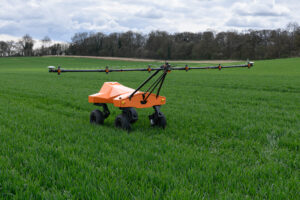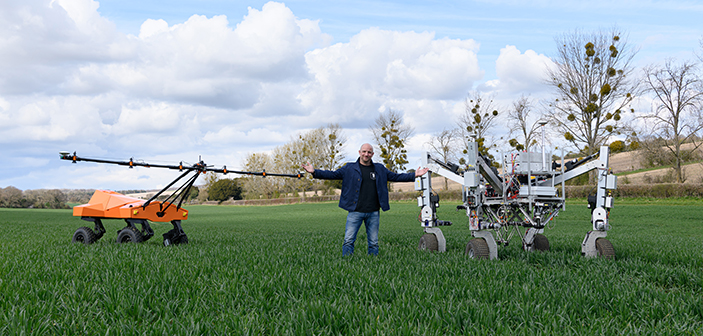Small Robot Company (SRC), a British agritech start-up for sustainable farming, announced last week that it has successfully achieved its proof-of-concept milestone for developing robotic soil health intelligence, working in a collaborative project led by PES Technologies.
This step could provide farmers with accurate, repeatable soil health monitoring at farm scale. Agronomists and farmers could use this information to guide precision improvements to soil health, maximising yield and increasing revenue with minimum chemical input.
The groundbreaking pilot project is being conducted using SRC’s ‘Tom’ monitoring robot (who you can see in action here) to take soil samples with PES Technologies’ soil health sensor mounted on the robot. The sensor detects Volatile Organic Compounds (VOCs) released from soil. In the wider project, the sensor output is being correlated with information about 10+ soil health indicators, including microbial biomass and soil organic matter content.
The project consortium comprises PES Technologies, Small Robot Company, NIAB-EMR, HL Hutchinson Limited, the University of Essex and the Natural Resources Institute at the University of Greenwich. The project is funded by the government’s Innovate UK grant programme. Trial sites include the Lockerley Estate in Hampshire, where robots are a key part of its regenerative farming strategy.
Game-changing for soil health
Phase one of the pilot is now complete, with the proof-of-concept milestone now achieved. The team developed and attached a mechanical sampler to the robot, and successfully scanned farmland soils at the trial site, collecting soil samples for on-the-fly sensor analysis of Volatile Organic Compounds (VOCs). The sample size currently collected is 10cm3, weighing 400g.

Working together, the consortium is using machine learning approaches to profile soil health directly in the field by measuring “soil gases” (microbial Volatile Organic Compounds effluxed by various soil types and cropping systems) as well as trialling the sensing technology for automated, continuous in-field sensing with the SRC robots. Microbial VOCs other than carbon dioxide have not previously been exploited in a practical low-cost, on-farm method for measurement of soil health.
The next phase of the robotics-part of the project is for NIAB-EMR to conduct ground truthing on soil health data gathered. Samples collected by the robot will be sent to the lab for testing and analysis, and compared with the PES sensor data. This will be conducted in the autumn, including at five existing on-farm sites at Lockerley Estate, including comparisons with five years of historical data.
PES Technologies has developed a game-changing soil health analysis tool, working with leading industry and academic experts, including NIAB-EMR, to provide farmers with the most comprehensive picture of soil health they can get. In the project, the tool’s output data is being related to a variety of biological, chemical and physical soil health indicators, including microbial biomass and soil organic matter content, by analysing the activities and diversity of a soil’s microbial community.
Prior to this project in 2018, PES Technologies proved the technology could work for soil health in collaboration with NIAB-EMR.
Andrej Porovic, CEO, PES Technologies commented: “Healthy soils are key to profitable farming. Poor soil health is reducing the productivity and profitability of the agricultural industry worldwide – in particular, it is impacting yields and soils’ resilience to changes in climate. There are more micro-organisms per gram of healthy soil than there are people on the planet – but without these living microbes, soil is not soil, but just dust. Choosing the right way to improve soil health is vital. We believe that putting our technology on SRC’s robots would be a real game-changer.”
Craig Livingstone, one of the first farmers to trial the new technology, SRC Farmer Advisory Group and National Food Strategy Board representative said, “Robotics offer us a real chance to answer the many questions of modern agriculture in responding to climate change, carbon sequestration, biodiversity and of course soil and food security. The light weight, low impact monitoring robot Tom is now on my farm scanning emerging wheat, and taking soil samples to assess soil health. In time, by reducing the trafficking on our soil, minimising the use of pesticides, I’m convinced this can only add to more productive, functioning soils capable of producing quality nutritious food.”
Gateway for Carbon Testing
In future, robotic monitoring could also provide accurate, repeatable carbon measurement at farm scale. This could be transformational in providing accurate carbon sequestration measurement to support UK farming’s transition to Net Zero by 2040. In the UK alone, 18 million tonnes of emissions could be converted into anything up to 6 million tonnes of CO₂ locked back into the soil, every year. That is a net difference of 24 million tonnes, the equivalent of two thirds of the UK’s emissions from aviation.

“The UK – and UK agriculture – have made bold commitments to Net Zero,” agreed Sam Watson Jones, President and co-founder, Small Robot Company. “Robotics can already take billions of accurate measurements in each field. This will transform the way that farms are able to sequester and cycle carbon, and measure that accurately. The opportunity for UK (and global) agriculture to support the transition towards Net Zero is enormous.”
Craig Livingstone continued: “The climate and biodiversity emergency are here and now for farming. The carbon objectives for our business are really important, focusing strongly on our operations emissions reductions and carbon sequestration. An overarching strategic aim for our business is to be Net Zero, and robotics will be a key tool to take us there.”
Rob Macklin, the National Trust’s Head of Farming and Soils, commented: “Technology needs to play a big part in solving many of the issues we currently face in farming – particularly improving soil health and carbon sequestration, reducing our reliance on fossil fuel power and fertilisers and avoiding the adverse impacts of synthetic chemicals on the environment. We have started small robot trials at Wimpole and intend to extend trials to other estates in the near future.
Calum Murray, Innovate UK’s Head of Agriculture & Food, concluded: “It’s fantastic to see how Innovate UK’s funding has supported Small Robot Company to develop game changing technologies that will revolutionize the agriculture sector. At Innovate UK, we are proud to be supporting the transformation of the UK’s food production systems, improving productivity and sustainability, and helping the industry move towards achieving net zero emissions by 2040.”
The Small Robot Company were recent guests on our podcast, Machinery Matters, you can find out more about the podcast and where to stream , here.


